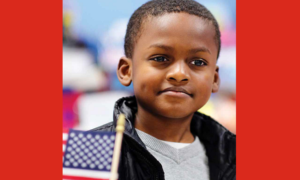Remember that Rose Garden 501(c)(3) baby delivered suddenly by Bill and Hillary Clinton last May?
Not too many people, even in the youth field, recall that pacific event. But the campaign, known as the National Campaign Against Youth Violence, led since last August by San Francisco lawyer Jeff Bleich, is set to leave the organizational development nursery and go public in mid-April. Bleich is the CEO and director.
Kicked off at the White House following a post-Columbine summit on youth violence, the new creation had little more than a birth certificate signed by the president. No welcome wagon greeted the largely niche-less addition to the nation’s already cacophonic – and often mutually self-defeating – undertakings to end murderous mayhem on the streets and in the schoolhouse.
For several months the White House Domestic Policy Council looked for a home for their boarder baby while staffer Eric Liu gave new meaning to “domestic.” That search led to an Air Force One phone call from President Clinton to Bleich, a former law clerk to the liberal D.C. Court of Appeals Judge and former Democratic congressman Abner Mikva, as well as to conservative Chief Justice William Rehnquist. Loved the book, “From Children to Citizens,” co-authored by Bleich in 1987, said the president. You’re my choice to adopt my Rose Garden baby.
The emergency parenting tasks unloaded on Bleich’s doorstep, said a White House press release last August, are to “head an independent, national, nonpartisan campaign that will address the problem of youth violence by: 1) serving as an information clearinghouse to share what programs work in one community with communities all over the country; 2) securing commitments from all sectors of society to do their part to help reduce violence; and 3) helping give parents more tools to protect their children from violence.” That mission could also describe a dozen other federal government and philanthropically funded national Save-the-Kids efforts already up and running (but not necessarily to any noticeable effect) long before Columbine.
Initially, Bleich’s new baby came without so much as food stamps, but a little White House cooing to the likes of Steve Case, president of AOL, fended off post-White House-media-event trauma syndrome.
Bleich hired Mark Abbott, COO of Major League Soccer, as the Campaign’s part-time COO, based in L.A. Next on board was Lisa Danzig as national outreach director, a former youth worker with the San Francisco Mayor’s Neighborhood Crime Prevention Program, who works out of Bleich’s offices at the law firm of Munger, Tolles and Olson, where Bleich remains a partner.
Hired in November in D.C. to raise the $15 million in funds that was Bleich’s own ambitious original goal was Peter Sheerer, the former development director of the nonprofit National AIDS Campaign. Joining Sheerer on the Campaign’s D.C. staff last month was Sarah Ingersoll as deputy director. Ingersoll spent the last six years as the right-hand woman to OJJDP Administrator Bilchik, ending up as his chief of staff. A smart and hard-working professional, Ingersoll’s overconfidence and her relatively inexperienced programmatic judgements made her a target of scorn by many of OJJ’s old timers. Said one veteran, “She is not one of the more popular people here.” With Bilchik’s departure to be executive director of the Child Welfare League of America, Ingersoll’s quick jump to be au pair to Bleich’s failing-to-thrive baby came not a diaper change too soon.
Serving as director of the Campaign’s national youth campaign is Trenton, N.J.-based Alan Rambam, founder of SHINE (Seeking Harmony In Neighborhoods Everyday), an arts and technology oriented program that emphasizes youth empowerment.
Sniffed one African American who works full-time on youth violence issues about the Campaign’s staff, “They’re awfully white.”
Bleich announced formation of a 34-member Academic Advisory Council loaded with big names, but says one expert who knows almost all of them, “[They are] lacking in real-world relevance.” But since when did that become a disqualifier in posing as a parenting guru for community-based youth work?
The council chair is John Devine, New York University (retired), the founder of the School Partnership Program (a collaborative project between the New York City Board of Education and New York University) and author of “Maximum Security: The Culture of Violence in Inner-City Schools.” Among those on the council are eight from Harvard: William Julius Wilson, noted for his “The Truly Disadvantaged”; Dr. Felton Earls, who has studied the critical relationship of fathers to children; David M. Kennedy, a senior researcher at the Program in Criminal Justice Policy and Management at the Kennedy School; Mark H. Moore, director of the Hauser Center for Nonprofit Institutions and one of the authors of “From Children to Citizens: The Mandate for Juvenile Justice” and “Beyond 911: A New Era for Policing;” Richard B. Freeman, who holds the Herbert Ascherman Chair in Economics, and is the project co-coordinator for Youth Unemployment and Employment in Advanced Countries; Dr. Deborah B. Prothrow-Stith, who established the first Office of Violence Prevention in a Department of Public Health and wrote the first violence prevention curriculum for schools and communities entitled “The Violence Prevention Curriculum for Adolescents”; Sissela Myrdal Bok, a Distinguished Fellow at the Harvard Center for Population and Development Studies and author of “Mayhem: Violence as Public Entertainment”; Dr. Alvin Poussaint, director of the Media Center at the Judge Baker Children’s Center in Boston, and a former chairman of the board of directors of Push for Excellence.
Also on the board: Kenneth A. Dodge, Duke University, a William McDougell professor in the department of public policy studies; Delbert Elliot, professor of sociology and Director of the Center for the Study and Prevention of Violence at the University of Colorado; Jeffrey Fagan, Columbia University, a member of the MacArthur Foundation’s Research Network on Adolescent Development and Juvenile Justice; Philippe Bourgois, University of California at San Francisco, author of “In Search of Respect: Selling Crack in El Barrio,” a study of the crack business in East Harlem; William Damon, Stanford University, director of the Stanford Center on Adolescence, presently working on a project to develop youth charters for schools and communities nationwide; Nancy Scheper-Huges, University of California-Berkeley, consultant to the United Nations on such issues as children and warfare; Carl Taylor, University of Michigan, author of “Dangerous Society,” a study of the urban youth gangs of Detroit; Michael Klonsky, University of Illinois, an academic leader in the “Small Schools Movement” centered in Chicago; James Q. Wilson, University of California at Los Angeles, author of “The Moral Sense” and “Thinking About Crime”; Franklin E. Zimering, Boalt Hall School of Law, University of California-Berkeley, director of the Earl Warren Legal Institute and author of “American Youth Violence;” James Gabarino, Cornell University, director of the Family Life Development Center and author of “Raising Children in a Socially Toxic Environment”; James Alan Fox, Northeastern University, dean of the College of Criminal Justice and author of “Killer on Campus”; Daniel Nagin, Carnegie-Mellon University professor of Public Policy, whose research focuses on the evolution of criminal and antisocial behavior over the life course; Mercer L. Sullivan, School of Criminal Justice, Rutgers University-Newark and Senior Research Fellow at the Vera Institute of Justice, New York City; James F. Short, Washington State University, whose areas of expertise include juvenile delinquency and criminology; and Terrie Moffitt, University of Wisconsin, who does life-span longitudinal research with large samples in field settings.
The National Youth Action Council Members are Sherrie Abufakuseh (18), chair of the Youth Advisory Board of the Illinois Violence Prevention Authority; Jennifer Cheslock (18), on the committee of the National Youth Network and facilitator of a forum at the National Youth Crime Prevention Council; Phally Chroy (17), who works with Asian Americans United in Philadelphia, PA; Carter J. Gaston (18), who works with A.R.C.H. Productions; Laura Gomez (17), who works with the L.A. County Housing Authority; Monica Holloway (17), who has been involved with Teens on Target; Natalie JoAnne Hintz (17), who established SAVE (Students Against Violence Everywhere); Dayna Johansen (18), who is involved with United National Indian Tribal Youth (UNITY); Ben Kaufer (17), who works with North Carolina Lambda Youth Network, Denita Lima (17), who hosts Graffiti Street, a weekly youth-to-youth television show; Shalourae Marie Mitchell (21), a City Year AmeriCorps member; David Mumaugh (16), a youth editor for the Sexual Minority Youth Assistance League (SMYAL); Justin Newland (19), who joined Future Homemakers of America in junior high and is now working with the National Organizations for Youth Safety; Franklin Onuoha (17), who is involved with Peace Games, a violence prevention education organization; Sergio Rivera (18), a mentor at the Primo Boxing Club at the Pro-Youth Coalition in Santa Barbara; Steve Roel (16), who is starting a Youth Advocates program in his community; Dun Wang (19), from Mothers Against Drunk Driving, who works with the National Organizations for Youth Safety; and Tasha Williams (17), from Youth Force, who performs Legal Education Workshops in the South Bronx.
The group held a three-day gabfest at Harvard’s Kennedy School of Government, where Bleich’s co-author on the tome that Clinton loved, Prof. Mark Moore, grandly holds forth to little effect on criminal justice matters. Moore and two-thirds of the council attended the Harvard gathering – not a bad turnout considering that, so far at least, there is no big money on the changing table.
Getting this baby through its first year has been a “cobble it together” effort, admits Bleich. Most elusive has been assembling a board of directors. Following the dictates of his baby’s Godmother and New York U.S. Senate candidate Hillary Clinton, who knows that it takes a village to raise a child, Bleich has been struggling to assemble a board of “at least 34 members.” In November Bleich was predicting the board would be announced in “early December.”
In mid-April, after what Bleich calls “some good fits” of progress, the bashful baby will finally be ready for public viewing. Scheduled to be announced is the board of directors, two PSA campaigns developed jointly with the Ad Council – one aimed at youth the other at “care givers” – and a “big corporate partnership” venture of unknown substance or scope.
Rose Garden baby will make its first curtain-raising appearance in Memphis, where the Campaign’s 15 City-by-City initiative will “encourage local businesses to make a long-term commitment to youth violence prevention.”
So far the Campaign has only raised $300,000 in private funds, plus a $100,000 contribution from Uncle Sam via the Justice Department’s Bureau of Justice Assistance.
That leaves the National Campaign Against Youth Violence about $14.5 million short of its $15 million fund-raising goal. Another year like its first and Rose Garden’s baby may wind up in the custody of Memphis’ garbagemen, best remembered by history for their 1968 strike which led to Martin Luther King, Jr.’s final nonviolent social justice campaign. Contact: (415) 512-4008.





























